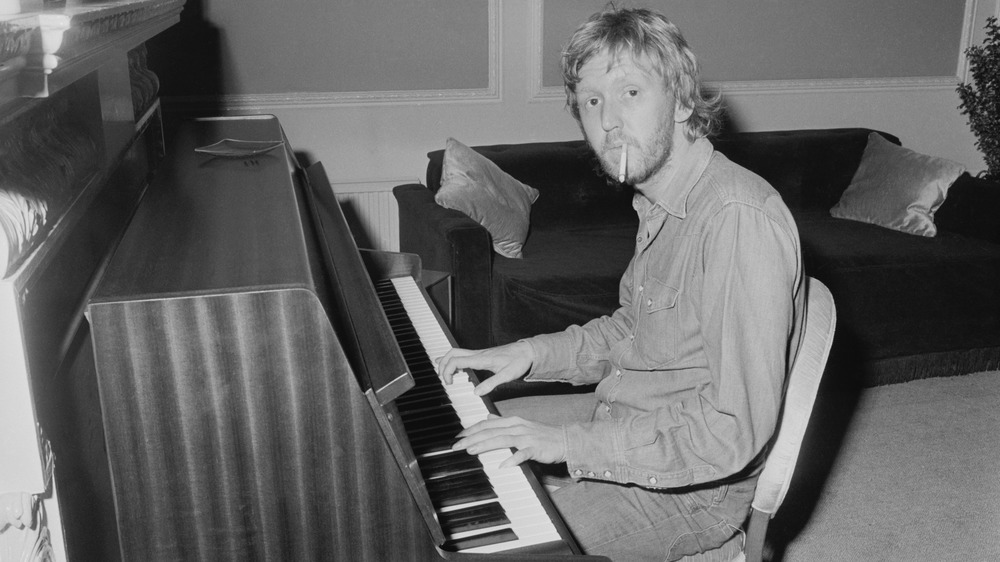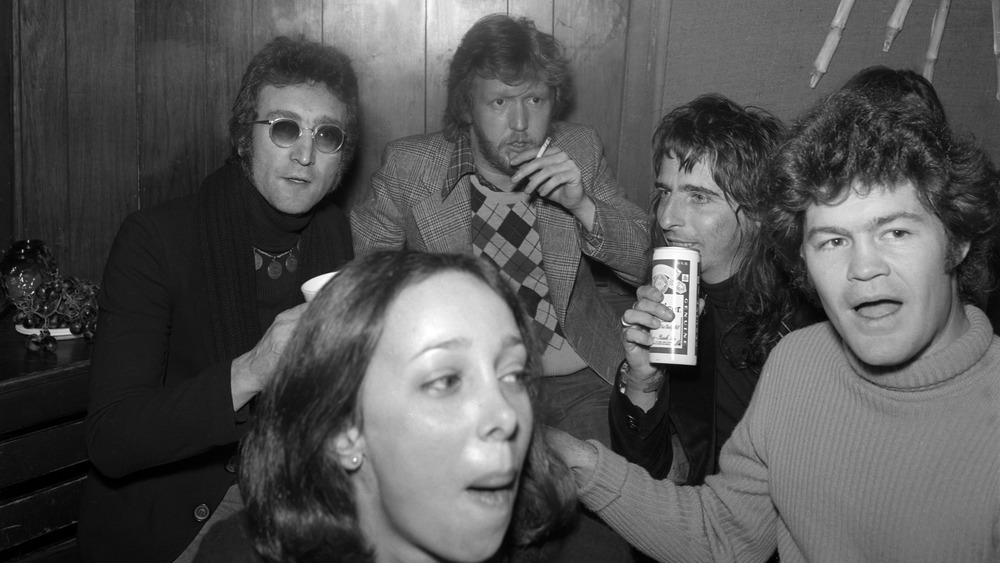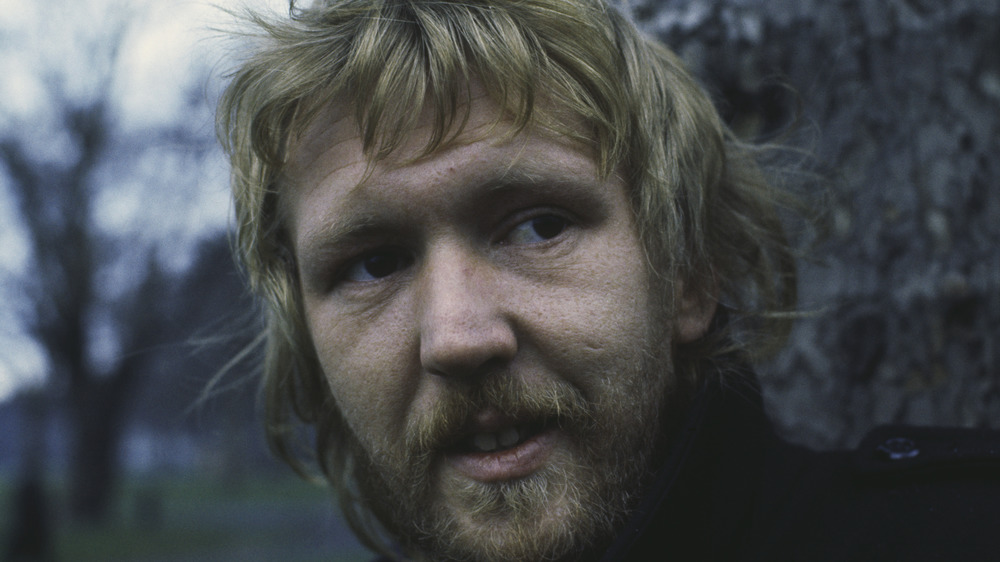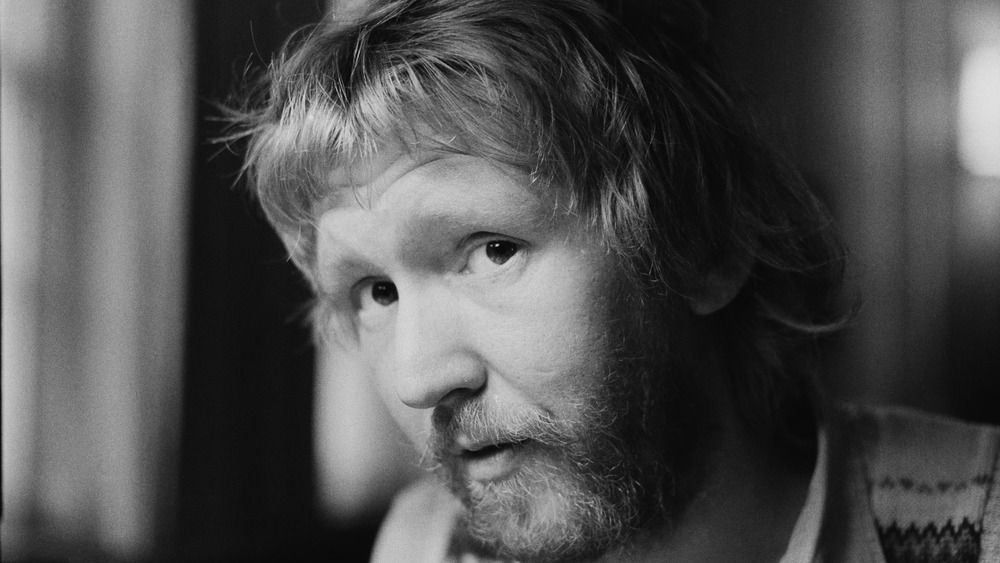The Tragic Story Of Harry Nilsson, The Beatles' Favorite 'Group'
Back in the late 1960s, a line from one of the Beatles printed in the press changed the world. John Lennon found this out when in March 1966, just prior to the band's final American tour, he told London Evening Standard journalist Maureen Cleave: "We're more popular than Jesus now." According to Britannica, the line, which met with little response from British readers, caused a storm of controversy in the U.S. with its republication in the teen magazine Datebook that July, leading to the burning of Beatles merchandise by outraged Christians and the potential cancellation of the tour.
But some of the Beatles' off-the-cuff remarks could also change lives for the better, and did so in 1968, for a young, still-unknown singer-songwriter named Harry Nilsson. By then, Nilsson had released two albums, 1966's Spotlight On Nilsson and Pandemonium Shadow Show the following year, to little commercial success or critical fanfare. Yet, one person who had taken notice was John Lennon, who in response to a question about the state of American pop claimed that "Nilsson is my favorite group," apparently under the apprehension that Nilsson — as he was credited on the album sleeves — was the name of a full band. Answering a similar question later that year, Lennon declared: "Nilsson for President!" By then, it seemed, he had become aware that the eclectic, playful albums he had grown to love were predominantly the work of one man. For Nilsson, Lennon's comments would mark the start of an incredible new phase in his creative life.
Nilsson & Lennon's rollercoaster friendship
As reported by Variety, it was not long before the Beatles got in touch with Harry Nilsson directly and invited him to visit them in London, beginning what the magazine describes as a "mutual love affair." Nilsson had created his own tribute to the band on Pandemonium Shadow Show with the track "You Can't Do That," an impressive, ludic medley of (at least) 14 individual Beatles classics that Grantland described as "the first mash-up."
Nilsson's friendship lasted beyond the lifespan of the Beatles, who broke up in 1970. He remained particularly close with John Lennon and was with him with some of the highest — and lowest — points of that tumultuous post-Beatles decade. The two were members of the notorious Hollywood Vampires drinking club, a circle of like-minded hedonists that included Alice Cooper and The Who's Keith Moon, according to the NME, around whom much of Lennon's 18-month "lost weekend" would revolve.
Though alcohol and drugs were central to the friendship between the pair, theirs was also a story of collaboration and mutual artistic admiration. After helping Harry Nilsson to gain a wider audience thanks to a series of hit singles including "Without You," "Everybody's Talking," and "One," Lennon went on to produce Nilsson's album Pussy Cats in 1974.
However, it was around the time of these sessions that Nilsson's impeccable three-octave range would be irreversibly damaged. According to American Songwriter, the singer hemorrhaged one of his vocal cords, while attempting a "primal-scream-like" take of Bob Dylan's "Subterranean Homesick Blues."
Harry Nilsson was heartbroken by the death of John Lennon
Harry Nilsson's voice was never the same again; following the release of Pussy Cats, argues Rolling Stone, "Nilsson's work thereafter was more desultory, and by the end of the '70s, he seemed to have dropped out of sight altogether." But things took a darker turn at the end of the decade, with the tragic murder of John Lennon by an armed fan in New York on December 8, 1980.
The death of his longtime friend, collaborator, and champion had a profound effect on Harry Nilsson, who took an extended hiatus from music and instead committed himself to The Coalition to End Gun Violence, becoming their national spokesman and a valuable famous face among supporters of the movement. Nilsson remained active within the campaign for the rest of his life, moving away from pop songwriting and dabbling more regularly with writing scores for movies, including 1980's Popeye.
The untimely death of Harry Nilsson
Harry Nilsson himself also died tragically young. By the 1990s, now more or less in obscurity, Nilsson's health was beginning to suffer. He hadn't released an album in over a decade, according to The Washington Post, and had been diagnosed with diabetes, which had forced him to give up drinking.
Per the Independent, the songwriter was also broke. The newspaper quotes Nilsson's friend, the director Terry Gilliam, as saying "He told me he went to bed a multi-millionaire and woke up with $300," claiming his ruin was the fault of Nilsson's financial manager.
When Harry Nilsson suffered a heart attack in 1993, he reportedly decided it was high time to return to recording. The Washington Post reports that Nilsson, armed with a set of new demos, attempted to strike a new recording contract with Warner Bros. but was turned down. His final public appearance was with Ringo Starr and his All Starr Band at a concert in Las Vegas, according to Ultimate Classic Rock. He died January 15, 1994.
Nilsson's association with The Beatles changed his life and ripples of their association continue to be felt today. When Nilsson's son, Zak, announced his cancer diagnosis in 2019, he received a letter from Paul McCartney, wishing him a swift recovery. The letter, published by Far Out Magazine, also noted: "I was very privileged to know your Dad whom I knew as a lovely guy and a great talent."



